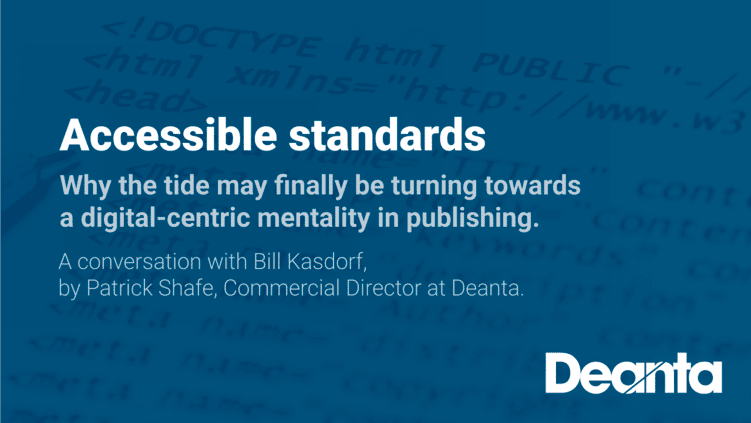Technological innovation is something that the publishing industry claims to aspire to and want. However, in practice, book publishers don’t seem to be making much headway. That’s why want to use this blog to talk about cloud-based publishing technology and its impact on the future of book publishing.
Cloud technology allows hardware, software, tools, and applications to be accessed by anyone, anywhere in the world, meaning it is game changing for small businesses and global enterprises alike. But we need to be clear – software as a service is not new territory for book publishers. Most big businesses already shelve a significant portion of their business critical IT infrastructure in the cloud (so we can assume that mainstream book publishers are much the same).
And SaaS poses opportunities for small and medium sized book publishers looking to scale up. IT professionals in the publishing business also need to understand and advocate for cloud-based publishing solutions where overcoming the status quo might prove difficult. Managers across publishing departments need to include the cloud in any assessments of running their departments more efficiently.
Cloud customisation
Many companies are already mixing, matching, and customising cloud services to meet their needs. And publishers should be aware that there’s not a single element of their business where a cloud-based solution doesn’t exist – from ERP to title management via digital asset management, rights and royalties, and everything in between.
Key take-away: Benefits of cloud technology to book publishers
We’ve compiled this check list of benefits for publishers, large and small, in an attempt to elucidate an otherwise ‘cloudy’ (sorry) issue for book publishers.
Lower (or no) capital expenditure
The cloud has given rise to different ways (e.g. SaaS) of managing business-critical technology. By essentially outsourcing certain functions (with access dependent on a monthly retainer, for example) publishers can reduce spend on their technology infrastructure. Because systems do not have to be centralised and can be updated remotely, publishers can access the benefits of the cloud while moderating their technology spend.
Speed of application deployment
Once you have access to a server, your infrastructure is configured, and your applications packaged, you’re ready to start deploying your software. In the cloud changes to, and the deployment of new applications, are lightning fast meaning your team are up to speed and down to work much faster. In terms of operational efficiency, using the cloud is a no-brainer for conscientious book publishers for whom speed of application deployment is highly important.
Shorter time to market
Marketing and promotion is an area that publishers can improve on. They have tended to focus efforts on marketing to booksellers rather than consumers but this could be a mistake on their part. Historically, the goal has been to reach the right consumers and offer the desired products to grow revenues – this hasn’t changed, but the methodology has. With the growth of internet commerce and phenomena like influencer marketing, the B2B2C chain of command has been disrupted. Social media means publishers and authors can communicate with their fanbase on a granular level, and they must leverage this to good effect if they want to make sales. The acceleration of the publishing chain, made possible by the cloud, means that books can quickly move to the marketing and launch phase of the production process – giving publishers more time to navigate the brave new world of social marketing.
Lower cost of operation
The key to competitive success in any industry is the ability to get a product to market as soon as possible, as high quality as possible, and as cheaply as possible. Cloud computing has done this quite spectacularly for book publishing. Access to the global workforce means companies have a wider pool of talent to draw from. They can choose where to allocate resources, geographically, for the best return on investment. (i.e. offshoring). As the digital production and publishing industry matures, enterprise leaders will shift towards bringing services previously outsourced to international suppliers closer to home. The subtle change here is that publishers are moving from an obsessive focus on low cost to securing more quality services. Quality has regained its prominence thanks to the cloud.
Dynamic software
While a piece of software sounds like a tangible product, its potential is enhanced exponentially by the cloud. In the article “What Is A Book By Any Other Name?“, Roxana Theodorou says that an eBook is primarily a piece of software or an application. With this in mind, book publishers need to start thinking of eBooks less as books and more as software. Only then can publishers discover how to add value, and by what means, to a medium that has been significantly underexploited.
Thanks to the cloud, many publishing functions such as copy editing, design work, and proofing can be multi-tasked across time zones, with a single version being worked on. The alternative is bringing dozens of different documents into existence, at which point version control becomes an unwieldy nightmare. Cloud-based solutions like Deanta’s digital asset management system, Lanstad, make it easy to store, find, and share projects securely and efficiently, facilitating collaborative and cost-effective work.
For too long, technology spend has been the publishing industry’s blindspot. While technological advancements like cloud computing have enabled software engineers to develop better solutions and standards, innovation must attract investment if publishing businesses are really to see the benefits.
Other related articles and videos you may be interested in:
- What traditional publishers can learn from the rabble-rousers like Amazon?
- Onshore, offshore, unsure? We explore publisher-vendor partnerships
- Global Culture – The Culture of Copy Editing
- Today’s libraries, tomorrow’s museums?
- Will AI ever author?
- Is metadata missing from your publishing business sales strategy?
For more discussions on the future of publishing in the digital age, visit our publisher’s hub. We have articles, videos and guides on the impact of AI, how publishers can generate better revenues, onshore and offshoring advice and lots more.












